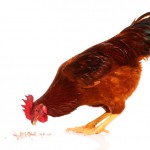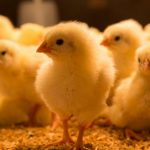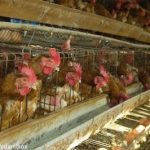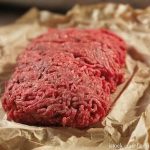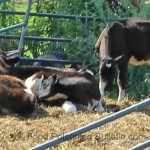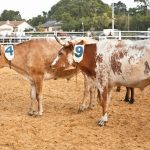The USDA's Agricultural Marketing Service (AMS) has issued a proposed rule covering requirements of the welfare of organic livestock. These changes are based on recommendations by the National Organic Standards Board. AMS Administrator Elanor Starmer said in a statement, "the demand for organic agriculture continues to grow each year and these proposed changes will build on USDA's efforts to support organic producers. By strengthening standards for organic livestock and poultry, we are ensuring that we meet consumer expectations and maintain the integrity of the organic seal to support the sector's continued growth. This proposal sets clear standards for organic animals, providing clarify to organic operations and certifying agents, and establishing a level playing field for all … [Read more...]
Perdue Grower Needs to Improve Culling Program
The Center for Food Integrity (CFI) says that a Perdue contract grower must improve his culling program. The animal welfare group Compassion in World Farming took a video of flock conditions and showed it to the agency. The video was edited, but showed that the farmer need to fix his euthanasia protocols. Animal welfare programs require farmers to inspect their animals twice a day. While the average mortality in birds is about 3 to 4%, in a flock of 30,000 birds 1,000 will die prematurely. The video shows chicks with broken legs, defective legs, and beak deformities. Other chicks are lethargic and sick. The video is also disturbing because broiler chickens are bred for rapid growth rate and increased breast meat yields, so the birds must spend most of their time squatting because … [Read more...]
CFS Report Slams USDA for Stalling Animal Welfare Regs
The Center for Food Safety (CFS) has issued a white paper that scolds the USDA for stalling poultry animal welfare regulations. Most egg and poultry operations would not be affected by the increased welfare standards. The USDA analysis of economic impact is "faulty", according to CFS. The paper states that the largest organic farms are not following standard animal welfare practices. USDA's own analysis showed that the welfare improvements would affect the largest organic egg producers so much that they would stop organic production. Those five farms, out of 586 organic poultry farms in the country, claim the increases in cost because of increased regulations will bankrupt them. Bringing larger broiler producers into compliance would result in a 2.5% increase in price. Impact on … [Read more...]
USDA Closes Central Valley Meat, Again
Central Valley Meat, a California slaughterhouse that supplies meat to the National School Lunch Program, has been closed by the USDA for unsanitary conditions, according to the Los Angeles Times. A recall has not been issued. The closure is the latest in a string of recent troubles for Central Valley, located in Hanford, CA. In 2012, the USDA closed operations at the plant for a week after a video by a nonprofit group showed workers mistreating animals. And six months ago, the company recalled almost 90,000 pounds of meat that may have contained small pieces of plastic. Details of the conditions discovered by USDA inspectors were not provided. But they said operations would be suspended until the compant had developed a corrective action plan. The previous closure, in 2012, … [Read more...]
Anti-Animal Welfare King Amendment Removed from Farm Bill
The King Amendment, proposed by Representative Steve King (R-IA), which would have undercut animal welfare states and food safety laws, has been removed from the Farm Bill. The Humane Society of the United States supports this action. The Humane Society Fact Sheet on this amendment details their opposition. HSUS states that the amendment was an "unprecedented assault on historic power of states to protect the health and welfare of their own citizens." It would have nullified state laws, forcing officials to authorize the sale and consumption of "any agricultural product", no matter how environmentally destructive or unsafe. The King Amendment violated the Tenth Amendment's guarantee that states' sovereign rights cannot be abridged by Congress. Congress' authority to regulate interstate … [Read more...]
Researchers Discover Reason for Broiler Vaccine Failure
Researchers at Auburn University have found the reason why vaccinations fail in some chickens in the U.S. The ARK IBV virus (Arkansas Infectious Bronchitis) causes infectious bronchitis in poultry even though the animals are vaccinated against it. The scientists found that the virus evolves as it replicates, making changes in the S1 protein that the chicken produces as a respond to the vaccination. These changes let the virus escape from the immune response. This discovery may lead to improved vaccines in the future. THe ARK IBV virus is very difficult to control. Unfortunately, vaccination for one type of the virus doesn't protect against all types. The research was funded by the U.S. Poultry & Egg Association. … [Read more...]
ASPCA Requests National Chicken Council Update Guidelines
The American Society for the Prevention of Cruelty to Animals (ASPCA) has sent a letter to the National Chicken Council (NCC), asking them to update guidelines for humane handling and living conditions for chickens. They say that "current unprecedented growth rates and standard living conditions of chickens not only pose serious concerns for their welfare, but may also present food safety risks." A report from May 2011 by the Humane Society of the United States found that sixteen scientific studies showed hens confined in cages had higher rates of Salmonella, the leading cause of food poisoning related deaths in the United States. A European Food Safety Authority analysis found 43% lower odds of Salmonella contamination in cage-free barns. Free-range birds had 98% lower chance of … [Read more...]
Government Has Exacerbated Problems with Industrial Animal Farms
Johns Hopkins Center for a Livable Future (CLF) has analyzed the Pew Commission on Industry Farm Animal Production (PCIFAP) report and its recommendations to fix health, environmental, animal welfare, and rural community problems caused by industrial food animal production (IFAP). The original report, "Putting Meat on the Table: Industrial Farm Animal Production in America" was released in April 2008. CLF began its analysis late last year. Dr. Robert Lawrence, director of CLF, said in a statement, "There has been an appalling lack of progress. The failure to act by the USDA and FDA, the lack of action or concern by Congress, and continued intransigence of the animal agriculture industry have made all of our problems worse." In 2008, the report found that the negative effects of … [Read more...]
Humane Society Opposes Farm Bill
Note: On June 20, 2013, the House failed to pass the Farm Bill 195-234. Of the 273 votes against the bill, 172 were from Democrats and 62 were from Republicans. The current Farm Bill expires in September 2013. The Humane Society is opposing the Farm Bill proposed in the U.S. House of Representatives because of the "King Amendment", proposed by Steve King (R-IA) that may let states repeal laws on farm confinement, horse slaughter, and shark finning. The amendment is titled the "Protect Interstate Commerce Act". In addition, House Republican leadership is refusing to add any animal welfare-related amendments to the Bill. Humane Society advocates say that the King amendment "undermines the longstanding Constitutional rights of states to protect the health, safety, and welfare of their … [Read more...]
Report Finds Intensive Farming Practices Hazardous to Humans
A report released by Compassion in World Farming and the World Society for the Protection of Animals has found that intensive factory farming is putting human health at risk. Factory farming that includes overcrowded conditions stress animals, increasing the risk of infection and the risk of these bacteria ending up in our food. In addition, the risk of swine and bird flu pandemics may be increased by these farms. The farms are often located in the same area, which increases the risk. Transporting animals over long diseases increases the risk of the spread and evolution of viruses from one species to another. Eggs from hens confined in small cages have more Salmonella bacteria than eggs from hens raised in cage-free systems. Eggshells have been contaminated with bacteria for years … [Read more...]
